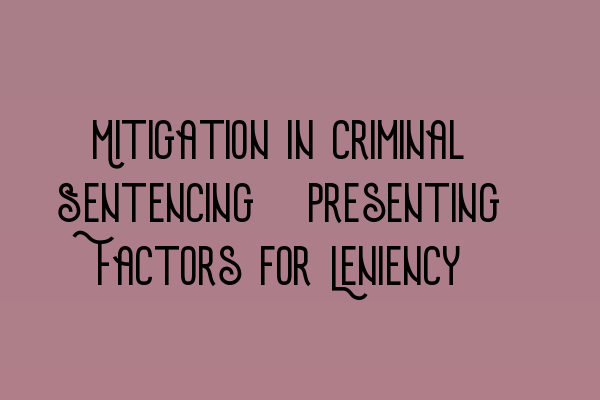Mitigation in Criminal Sentencing: Presenting Factors for Leniency
When facing criminal charges, it is crucial to understand the role of mitigation in the sentencing process. Mitigation refers to presenting factors to the court that may warrant leniency in sentencing. It is an opportunity for defendants to provide context, remorse, and evidence of positive personal circumstances.
Throughout criminal proceedings, it is important to work closely with your solicitor to develop a strong mitigation strategy. By presenting compelling arguments for leniency, you increase the chances of receiving a more favorable sentence. Here are some key factors to consider when presenting mitigation:
1. Personal Circumstances
Highlighting your personal circumstances can play a significant role in persuading the court to consider a lenient sentence. These circumstances may include:
- Your age
- Your mental health
- Your previous good character
- Any personal hardships or challenges you have faced
By providing a comprehensive overview of your personal circumstances, you can show the court that your actions were influenced by factors beyond your control.
2. Genuine Remorse
Expressing genuine remorse for your actions can significantly impact the court’s perception of your case. It is crucial to demonstrate that you understand the consequences of your actions and are genuinely sorry for any harm caused.
3. Rehabilitation Efforts
Evidence of your efforts towards rehabilitation can be powerful in presenting a case for leniency. This may include:
- Participation in therapy or counseling
- Enrollment in educational programs or vocational training
- Volunteer work or community service
- Letters of support from mentors, employers, or community members
By demonstrating your commitment to improving yourself and making positive changes, you highlight your potential for future rehabilitation.
4. Cooperation with Authorities
If you have cooperated fully with the authorities during the investigation or trial, it is essential to highlight this cooperation as a factor for leniency. Cooperation can include providing information, assisting in the recovery of stolen property, or testifying against others involved in criminal activities.
5. Unique Circumstances of the Case
Every case is unique, and presenting the specific circumstances surrounding your case can increase the chances of leniency. This may include:
- Contextual factors that contributed to the offense
- Provocation or self-defense
- Misunderstandings or lack of intent
- Any unique factors that help explain your actions
By highlighting the unique aspects of your case, you can provide the court with a more comprehensive understanding of the situation.
Remember, the success of your mitigation strategy relies heavily on the expertise and guidance of your solicitor. Working with an experienced solicitor who understands the intricacies of criminal law and the sentencing process is essential.
If you are preparing for the SQE (Solicitors Qualifying Examination) and want to enhance your legal knowledge, we recommend checking out our related articles:
- SQE 1 Practice Exam Questions
- SQE 1 Practice Mocks FLK1 FLK2
- SQE 2 Preparation Courses
- SQE 1 Preparation Courses
- SRA SQE Exam Dates
By exploring these resources, you can enhance your legal knowledge and increase your chances of success in the SQE examination.
In conclusion, mitigation plays a crucial role in criminal sentencing. By effectively presenting factors for leniency such as personal circumstances, genuine remorse, rehabilitation efforts, cooperation with authorities, and unique case circumstances, you can influence the court’s decision and obtain a more favorable outcome. Working with a skilled solicitor who understands the complexities of mitigation is key to achieving the best possible result.
